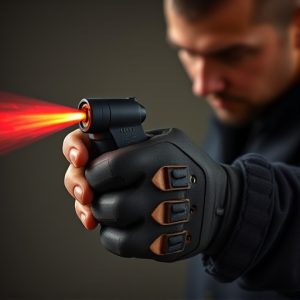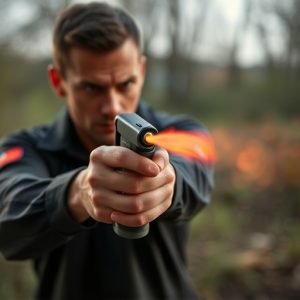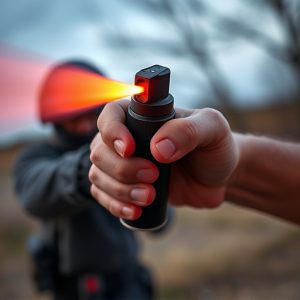Pepper Spray Defense: Effectiveness Across Climates and Legal Insights
Pepper spray effectiveness varies across different climates due to factors like temperature and humi…….
Pepper spray effectiveness varies across different climates due to factors like temperature and humidity, impacting its potency and duration. Cold temperatures can enhance its power by slowing evaporation, while high humidity dilutes the active ingredient, capsaicin. Urban areas with higher humidity may reduce pepper spray's effectiveness for self-defense compared to rural regions with lower humidity levels. Understanding these climate differences is crucial when selecting pepper spray formulations tailored to specific surroundings for maximum safety in diverse environments.
In today’s world, understanding aerosol spray defense, particularly pepper spray, is crucial for personal safety. This article delves into the science behind this powerful tool, exploring how it works and its effectiveness in various settings—from bustling urban areas to remote rural landscapes. We examine legal considerations, real-world use cases, and essential safety precautions. Discover why knowledge of pepper spray’s dynamics is vital for navigating different climates, ensuring your safety and peace of mind.
- Understanding Pepper Spray: How Does it Work?
- The Science Behind Aerosol Spray Defense
- Effectiveness in Different Climates: Urban vs Rural Settings
- Legal Considerations and Use Cases
- Safety Precautions and Best Practices
Understanding Pepper Spray: How Does it Work?
Pepper spray, a common self-defense tool, uses capsaicin, the active ingredient found in chili peppers, to cause temporary blindness and respiratory distress in attackers. When deployed, it creates a disorienting fog that can disable an aggressor for several minutes, allowing the user time to escape or seek help. The effectiveness of pepper spray lies in its ability to disrupt balance and visibility, making it particularly useful in close-quarters encounters.
While pepper spray’s performance isn’t significantly influenced by climate, environmental factors can impact its usage. In colder temperatures, the spray may dry faster, reducing its concentration and reach. Conversely, high humidity levels can make the capsicum oil more potent and potentially cause stronger side effects. Understanding these nuances ensures users deploy pepper spray optimally in various conditions, enhancing its overall effectiveness as a defensive measure.
The Science Behind Aerosol Spray Defense
The science behind aerosol spray defense involves a careful balance of chemical compounds designed to disrupt an attacker’s senses and provide time for escape or assistance. Pepper spray, a common type of aerosol defense, works by irritating the eyes and respiratory system through capsaicin, the compound responsible for chili peppers’ heat. This irritation causes temporary blindness, coughing, and difficulty breathing, enabling the user to flee or deter the attack.
The effectiveness of pepper spray isn’t uniform across different climates and environments. Temperature plays a crucial role; in colder climates, pepper spray might evaporate more slowly, increasing its potency. Conversely, high humidity can reduce its effectiveness as water droplets in the air can dilute the spray’s concentration. Therefore, choosing the right type of aerosol spray for your specific environment is key to ensuring its reliability when needed most.
Effectiveness in Different Climates: Urban vs Rural Settings
Pepper spray, a popular self-defense option, demonstrates varied effectiveness depending on the climate and setting. In urban environments, where humidity levels are often higher due to human activity and infrastructure, pepper spray can be less potent. The increased moisture can reduce the concentration of capsaicin, the active ingredient responsible for the burning sensation, rendering it slightly less effective in disorienting attackers. Conversely, rural areas with lower humidity levels may provide better conditions for the spray’s potency, as the lack of moisture allows for a more concentrated and prolonged impact.
These climate differences highlight the need for users to consider their surroundings when choosing pepper spray as a defense mechanism. Urban dwellers might opt for formulations designed to perform optimally in higher humidity, while those in rural settings could benefit from products tailored for drier conditions. Such considerations ensure that individuals are prepared with the most effective tool for their specific environment, enhancing their ability to defend against potential attackers.
Legal Considerations and Use Cases
When considering aerosol spray as a defense mechanism, it’s crucial to understand the legal implications and appropriate use cases. The legality of carrying and using pepper spray varies significantly across different regions, with certain areas having strict regulations or outright bans. Despite this, when used responsibly and in accordance with local laws, pepper spray has proven effective in deterring and neutralizing attackers, providing a powerful tool for personal safety.
Use cases vary based on individual needs and environments. In outdoor scenarios, especially those involving different climates, the effectiveness of pepper spray can be influenced by factors like temperature, humidity, and wind. However, modern formulations have improved consistency and performance across various conditions, making it a viable option year-round. Urban settings or high-risk professions may benefit from trained personnel carrying aerosol sprays as part of a comprehensive security strategy.
Safety Precautions and Best Practices
When employing aerosol spray for defense, safety should be your top priority. Always ensure you understand and comply with local laws regarding the carrying and use of pepper spray or other similar products. Proper training is essential; learn how to aim accurately and determine the appropriate distance, as improper usage could lead to unintended consequences.
Considerations for different climates are vital. Pepper spray’s effectiveness can vary based on environmental factors such as temperature and humidity. In hotter climates, the spray may evaporate too quickly, reducing its impact, while in colder regions, it could freeze mid-application. Therefore, users should be aware of these variations and adjust their tactics accordingly to ensure optimal protection.
Pepper spray has proven to be an effective self-defense tool, especially in urban settings, where its immediate impact can disrupt attackers and enable escape. However, its effectiveness across different climates varies; understanding these nuances is crucial for optimal use. While research continues to enhance its performance, proper application techniques and safety precautions remain paramount. When used responsibly, pepper spray can be a game-changer in personal defense, offering a strategic advantage in various environments, from bustling urban streets to rural areas.


